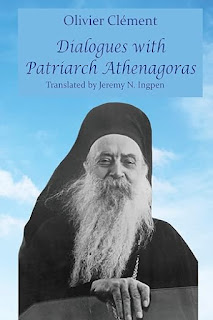Clément, Olivier. Dialogues with Patriarch Athenagoras. tr. by J. N. Ingpen. Brookline, MA: Holy Cross Orthodox Press. 2022
One of the signs of a book that could be deemed prophetic is its continued relevance close to fifty years after its original publication. Olivier Clément’s Dialogues with Patriarch Athenagoras, recently translated from the French by Jeremy Ingpen, is just such a book. Set within the framework of an intimate dialogue between Clément, an outstanding Orthodox theologian, and Patriarch Athenagoras, the Ecumenical Patriarch from 1948 to 1972, this book opens a treasury of Orthodox reflection that we desperately need to hear in our day. The power of the book lies in its ability to let the reader eavesdrop on the interchange of two brilliant thinkers as they reflect on any number of important issues, both spiritual, theological, and cultural.
The book is divided into three
parts. The first, “A Man Called Athenogoras,” gives a historical overview of the Patriarch’s
life, helping the reader to understand the context he came from. It is the tale
of a bright young man whose gifts took him from monastic profession, to service
under the bishop of Monastir, to living for a time on Mount Athos, to serving
as the chief secretary of the Holy Synod of Athens, to being elevated to the
episcopacy as Bishop of Corfu, to then being elected Archbishop of America in
1930, where he served until he was elected Patriarch of Constantinople in 1948.
Throughout his years as a bishop, not only was he known for immense pastoral
sensitivity and service, but also he was involved actively in ecumenical work,
which would serve him particularly well when he became Patriarch.
The second part of the book, “Words,”
begins the dialogue itself between Clément and the Patriarch, which took place
in 1968. It focuses on both theological and spiritual issues, showing their
relation with genuine church renewal. Topics covered include the power of
Paschal faith, the importance of ecclesiology, the significance of liturgy in
the life of the Church, renewing spirituality, the theophanic reality of
nature, as well as the Church’s attitude towards politics and its relation with
Islam. As a dialogue, this section
brings the two interlocutors to life, and one senses the passion and zeal for
the faith both of them have. There were numerous times when I found myself
saying, “even in the late 1960s people were talking about this,” such as the
Patriarch’s comment that there should be the possibility of marriage (or
re-marriage) for a priest after ordination, or more broadly, bringing up the
difference between Tradition and custom. All this and much more contributes to
why this book has such a contemporary feel to it.
The final section of the book, “Acts,”
focuses on the Patriarch’s passion and efforts at reconciling Christians with
each other. It provides his own insights and recollections of such momentous events
as meeting Pope Paul in Jerusalem in 1964, the lifting of the Anathemas in
December of 1965, as well as his continuing efforts to bring healing between
the Orthodox churches themselves, his encouraging them to become more involved
in the ecumenical movement, and his efforts at negotiating a meeting of all the
representatives of the Christian churches in Jerusalem, on Golgotha where they
might join in prayer that the Church be reunited. This last ambition was never
realized; however, the Patriarch’s thoughts on all manner of things ecumenical
is brought out in what I consider a nuanced and prophetic manner. Truly it is
an illuminating example of what is best in Orthodoxy, and how that has the
possibility of serving the wider Church.
This is an important book, one that
will richly reward attentive readers with deeper insights into their faith and that
will challenge them to live that faith more seriously. The translation by
Jeremy Ingpen reads smoothly and beautifully, and because it is presented in
the form of dialogues that actually took place, it is not weighted down with
heady theology that is often difficult to penetrate for anyone but the most
seasoned theologian. Instead, it is accessible and interesting, a work that
will be of benefit to any dedicated reader. I cannot recommend the book highly
enough.
Brother Christopher



Comments